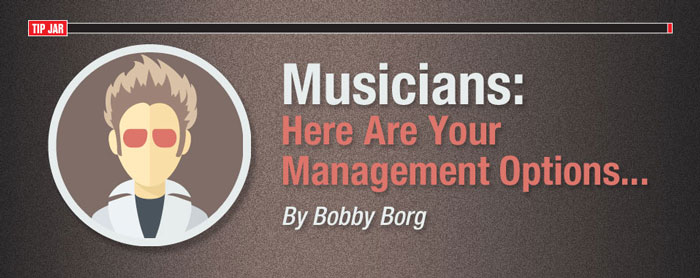
While personal managers are at the top of most developing artists’ minds, hiring one might be a long ways off until you generate some career traction. This is what makes understanding managers and what they do so important. Let’s take a look at your management options, what you can expect from a personal manager once you’ve hired one, and the commissions you will pay.
Manage Yourself First
In the early stages of your career, good management must always begin with the artist. Unless one of your relatives happens to be a record label or publishing company president, no one is going to help you until you first help yourself!
So, have you written a large repertoire of songs or even co-written with professionals? Are you drawing people to your live shows and selling a lot of records and merch? And are you enlisting your fans to help promote your music and your live shows?
In a digital age, it is far easier than ever before to take charge of your career. In case it hasn’t sunk in, before you can expect to get a personal manager, you must generate some traction first.
Look Into Start-up Management
After you’ve reached a point in your career where you’ve legitimately done all the things mentioned in the list above, and you just can’t go any further without a helping hand, then perhaps you’re ready for a start-up manager.
Start-up management might include: a close friend who’s willing to make phone calls and help promote shows; a club owner in your hometown who sees hundreds of bands perform each year and wants to help you out; or even someone who is an intern or junior assistant of a professional manager by day who’s looking to cut his teeth by managing his own band on his downtime.
While start-up managers may not be the most experienced folks, don’t underestimate their value. They can be some of the most loyal and hard working people around, and they’ll stick with you through the thick and the thin.
But be careful: becoming a personal manager does not require getting a license or state certification—anyone, from a used car dealer to a snake oil salesman, can be one—so proceed with caution. There are managers in the business, and there are damagers. Watch out for the damagers.
Graduate Into Established Professional Management
If you’re able to generate serious momentum in your career (get thousands of streams, start generating some income, and/or attract labels and publishers), then established professional managers will likely become interested in working with you. They may even seek you out. Established pros come in a variety of shapes and sizes—from the mid-level players to the big-league guys.
Mid-level managers are those who have a great deal of experience in the industry, but have not quite broken a band into superstardom. These are the guys who are typically well liked in the industry and have a big enough network to open some doors for you. However, the problem is that they are not as powerful as a big-league manager, and therefore it may take them longer to make progress in your career.
Big-league managers have been around for years and have lots of gold and platinum records hanging on their walls. The relationships they’ve formed, the respect they’ve earned and the favors they can trade give them the power to make things happen with just a few phone calls. However, the problem with big-league guys is that you could easily get overshadowed by their more profitable clients. Remember that bigger does not always mean better. The important thing is picking a manager who really wants to work with you––and has the time to work with you.
Know What To Expect Once You’ve Hired a Manager
Once you get a personal manager, you might be wondering what to expect from him or her? A manager might help with artist development and finding your sound, help you get exposure by setting up industry showcases/meetings with potential record companies, publishing people, merchandisers and more; meet with the various departments at the record label to make sure that everyone is acting in concert in preparation for an album release; and help you to find a licensed talent agent who specifically works on procuring live performances.
By strict definition, a manager’s role is to advise and counsel you in all aspects of the music business. But I like to think of managers as air-traffic controllers and of the artists, producers, publicists, fashion consultants, webmasters, publishers, A&R reps, attorneys and business managers as pilots. The air-traffic controller has a complete view of the runway and guides the pilots flying in and out of the airport to safety. If the air traffic controller gives one wrong signal to any one pilot, complete disaster could ensue.
Understand What To Pay Your Manager
Personal managers serve an important role in your career, and this means they get paid! Personal managers commission their “artist’s earnings” at anywhere from 15 to 30 percent, with the norm being 20 percent. A manager’s commissions are usually based on your “gross earnings.” (But note: The word gross, which typically means total earnings off the top, must be defined here as all monies other than recording funds, deficit tour support, video expenses and other specifically definded expenses.)
In some cases, personal managers often take a commission of the “net income” (the amount after expenses are paid out). But note that these expenses must be reasonable. In other words, managers are not going to allow tour expenses such as hotel parties and smashed TV sets to determine their compensation. Thus, as an additional precaution to ensure they get paid, managers who commission tour incomes on the net will take as much as 50 percent. A business manager or accountant you hire will usually collect all the monies, pay expenses and issue commissions.
Hire An Attorney To Review Your Contract
Finally, management agreements are made up of far more than just the commissions mentioned above (they include issues like exclusivity, agreement terms, expenses, power of attorney, and post-term provisions––i.e., what the manager gets paid after the agreement term). We would need a book to discuss these issues properly, so just remember that before entering into a relationship with a personal manager, you must hire an experienced entertainment attorney to ensure your best interests are protected. You can seek referrals from industry people who you trust, scout out an attorney at a local music conference, or look into directories (like the Directory of Music Attorneys at musicconnection.com) that cover the music business.
BOBBY BORG is the author of Music Marketing For The DIY Musician: Creating and Executing a Plan of Attack On A Low Budget (September 2014) available on Amazon or at bobbyborg.com.









